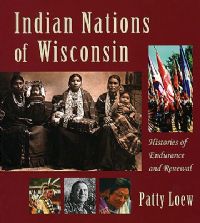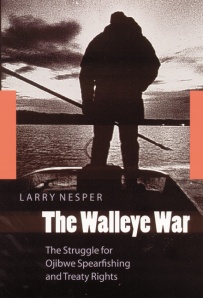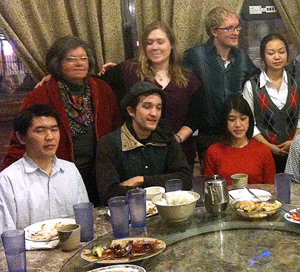In last week’s class, we learned about Indigenous languages and came away feeling that they’re something priceless to preserve. This week, TLAM focused on American Indian history. Or, as our guests emphasized, tribal histories. Maybe a little like Indigenous languages and dialects, each community has their own unique history to document, preserve, and share. This is just one reason why tribal libraries, archives, and museums are so important. There’s so much to remember.
 To help us learn more about tribal histories–and the history of history–we were joined by two friends from the UW-Madison History Department. Doug Kiel and Skott Vigil are graduate students pursuing PhDs. Doug is studying the 20th century revitalization of the Wisconsin Oneida; Skott is studying Indian/non-Indian relations in Colorado in the 19th century. Both provided a great overview of American Indian history, which was a great addition to one of this week’s readings, Patty Loew’s Indian Nations of Wisconsin: Histories of Endurance and Renewal.
To help us learn more about tribal histories–and the history of history–we were joined by two friends from the UW-Madison History Department. Doug Kiel and Skott Vigil are graduate students pursuing PhDs. Doug is studying the 20th century revitalization of the Wisconsin Oneida; Skott is studying Indian/non-Indian relations in Colorado in the 19th century. Both provided a great overview of American Indian history, which was a great addition to one of this week’s readings, Patty Loew’s Indian Nations of Wisconsin: Histories of Endurance and Renewal.
We also talked about historiography. Skott and Doug noted that much of American Indian history has been produced by scholars who conduct research through primary and secondary written sources, yet rarely reach out to Indian communities as a part of their study. As a result, the published histories of tribes and Indian/white relations have often reflected non-Indian perceptions of the past. With a new generation of scholars, this is changing. But the history of history needs to be remembered.
 For the second half of class, Larry Nesper, an Assistant Professor of Anthropology and American Indian Studies, provided an overview of Indian/non-Indian relations, especially legal relations with the United States government. He focused on the treaty making process, tracing its origins from the United States Constitution through present day court cases. The author of Walley War: the Struggle for Ojibwe Spearfishing and Treaty Rights, Larry also discussed the violent reaction to a 1983 court decision that restored reserved Ojibwe treaty rights to hunt, fish, and gather in northern Wisconsin’s ceded territories.
For the second half of class, Larry Nesper, an Assistant Professor of Anthropology and American Indian Studies, provided an overview of Indian/non-Indian relations, especially legal relations with the United States government. He focused on the treaty making process, tracing its origins from the United States Constitution through present day court cases. The author of Walley War: the Struggle for Ojibwe Spearfishing and Treaty Rights, Larry also discussed the violent reaction to a 1983 court decision that restored reserved Ojibwe treaty rights to hunt, fish, and gather in northern Wisconsin’s ceded territories.

It was a great week for another reason, too! Right after class on Wednesday (February 3), four TLAMers traveled to participate in the 5th Annual iSchools Conference at the University of Illinois Urbana-Champaign. It was such a fun trip. We hung out with our friends from LAMP (LIS Access Midwest Program); presented as a roundtable at the conference discussing our experience developing TLAM at UW-Madison; and were excited to met Miranda, Marisa, and Ally from the University of Washington’s Indigenous Information Research Group. We learned so much visiting with them and especially listening to their amazing, early-Saturday morning presentation on Native Systems of Knowledge: Indigenous Methodologies in Information Science. We are also very appreciative to have visited with Cheryl Metoyer again, also from the University of Washington.
Miranda, Marisa, Ally, and Cheryl… your work is so important! And your advice so very appreciated!
